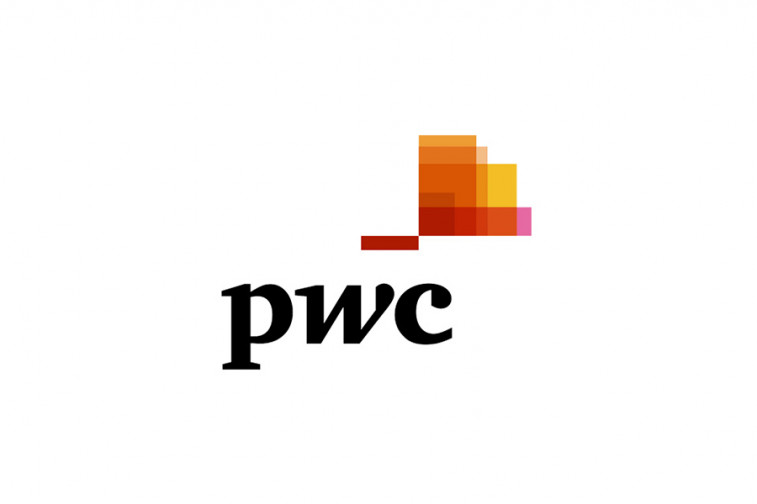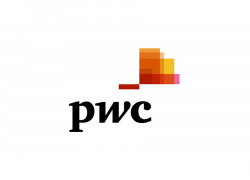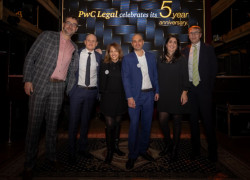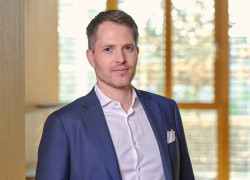Luxembourg's competitiveness: are we still in the race? Seizing the opportunities of global change
The 17th Journée de l’Economie took place on 26 March 2024 at the Luxembourg Chamber of Commerce. In the presence of Lex Delles, Minister of the Economy, and with keynote speeches by Lionel Fontagné, Michele Cincera and Serge Allegrezza, an exceptional number of over 190 participants discussed the theme “Luxembourg's competitiveness: are we still in the race? Seizing the opportunities of global change ”. Two panel discussions enriched the programme and allowed the visitors to raise their questions.
While last year’s edition of the Journée de l’Economie was much more focused on the geopolitical shifts and threats, notably in Taiwan and Ukraine and assessing the consequences on the global economy, this year’s dominating topics were related to Luxembourg’s current competitiveness, identifying the critical success factors from recent years and defining their role in shaping the Grand Duchy’s trajectory for the future. The discussion also endeavoured to explore innovation and emerging technologies in Luxembourg, investigating the country's role in shaping tomorrow's technological landscape while tackling the combined challenges of environmental and digital transformation.
The participants were welcomed by Serge Allegrezza, appointed Director of Luxembourg’s statistics bureau Statec in April 2003 and previously responsible for internal market policy and general economic policy at the Luxembourgish Ministry of the Economy and Foreign Trade. Mr Allegrezza underlined the Journée de L’Economie’s long history of 17 years and reminded the audience of the various topics that were previous main themes such as corporate social responsibility, pandemics and geopolitical challenges amongst others. Mr Allegrezza also stressed how, during the past three years, the competitiveness of Luxembourg was impacted by the pandemic, the energy crisis and the war in Ukraine.
The conference was opened by Carlo Thelen, Director General, Chamber of Commerce, who reminded those in attendance that Luxembourg has maintained a relatively high level of economic prosperity thus far, and that “the resilience capabilities of Luxembourg during the pandemic and the confirmation of the triple A rating in 2023 are very important elements of the country’s competitiveness”. However, Mr Thelen pointed out that this competitiveness has been deteriorating for several years with a significant drop over the last two years in business confidence across several sectors as reflected by the Chamber of Commerce’s latest Economic Barometer.
Mr Thelen added: “In a fast-changing environment whereby national resources are scarce, the time has come to create a new and more resilient model,” based on a dynamic energy transition and further diversification. He emphasised two concerning points, namely, R&D intensity, with Luxembourg R&D spending representing less than 1% of GDP in 2022, below the European average of 2.2%, as well as the stagnation of labour productivity. Within this context, Mr Thelen reminded the audience that innovation, the promotion of entrepreneurial spirit, high quality in scientific and technological infrastructure and attraction of talents are all crucial for the country’s future. He concluded that it will take courage and vision to maintain and increase the competitiveness of our economy, a sentiment echoed throughout the day.
Lex Delles, the Minister of Economy, spoke about the importance of competitiveness in his political agenda. He mentioned that productivity is the key element of Luxembourg's economic development and sustains the country's socio-economic model. Mr. Delles also highlighted the need for action in several areas, including R&D, innovation, digitalisation, skill retention, and the softening of the regulatory framework. The Ministry is actively working on measures to promote technological progress within companies. Mr Delles concluded that Luxembourg's competitiveness remains high despite a recent slight decline, with strengths including macroeconomic and political stability, a triple A rating, favourable business environment, and satisfactory regulatory framework. As for the points of improvement, Mr Delles mentioned the costs of labour, inflation, management practices or even the slow productivity growth.
Professor Lionel Fontagné of the University Paris I Panthéon-Sorbonne and the Paris School of Economics, spoke about the future of competitiveness and the energy transition. He highlighted the importance of considering the indicators that make up global rankings, such as the price of energy, and the challenge of collective action in discussing the energy transition between civil society and the government. Professor Fontagné also emphasised the heterogeneity of ambitions and instruments among countries that signed the Paris agreement on climate change, leading to distorted competition at the international level. He proposed the possible solution of an implicit price of carbon that would rely on a model, raising the question of which model should be considered for that purpose. His insights were both thought-provoking and informative.
Is Luxembourg still competitive?
Before the break, there was a panel of five keynote speakers, i.e. Serge Allegrezza, Director General, STATEC, Lionel Fontagné, Professor of Economics, University Paris I Panthéon-Sorbonne, François Mousel, Managing Partner, PwC Luxembourg, Richard Forson, CEO, Cargolux, Emanuele Vignoli, CEO, HSBC, moderated by Bérangère Beffort, Lead Public Relations & Advocacy, Chamber of Commerce and Vincent Hein, Director, IDEA.
The speakers shared their insights on the country's competitiveness in the face of fierce competition and unfavourable market conditions. Mr Allegrezza defined competitiveness as a two-fold concept referring to the competitiveness between companies and between countries, while Professor Fontagné warned against obsessing over rankings. When asked about the main strengths and weaknesses of Luxembourg, Mr Mousel emphasised that the main assets of Luxembourg are its diversity and political stability, while its weaknesses are linked to its size constraints and its disconnection between private businesses and the international economy. Mr Vignoli proposed three axes to strengthen the attractiveness of Luxembourg: a corporate vision aimed at attracting professionals to do business in Luxembourg, fostering education to promote Luxembourg as an excellent place to start his professional career and a government initiative aimed at making the country more attractive, highlighting the excellent work-life balance provided by Luxembourg. Finally, Mr Forson warned the unions that the labour cost in Luxembourg is “a prohibitive vector” that will “kill the competitiveness” of Luxembourg with the ultimate risk to have companies outsourcing their activities to jurisdictions where labour cost would be less expensive.
Michele Cincera, Professor of Economics at the Solvay Brussels School of Economics and Management-ULB, closed the keynote sessions with an enlightening speech about how innovation can boost post-crisis competitiveness, reflecting a new horizon for Luxembourg's economy.
Mr Cincera highlighted that competitiveness does not only imply the balance of exports and imports but also involves the quality of life that these economic activities support. He pointed out the various factors contributing to Luxembourg’s competitiveness with its infrastructure and connectivity, economic stability, business dynamism, market size, education and skills amongst others. Echoing a theme raised throughout the day, he noted that R&D is abnormally low for Luxembourg at less than 1% of GDP and even decreasing. He further mentioned that this low figure is due to the economic structure of Luxembourg in which finance and banking sectors - for which R&D is less impactful - account for a large part of the GDP. As such, the whole R&D potential is not fully used in Luxembourg and this needs to be changed. He concluded by stating that a focus on science, technology and innovation should be the main drivers to boost Luxembourg's competitiveness.
Innovation and new technologies: Where is Luxembourg today on tomorrow’s technologies?
The final discussion of the day was moderated by Cécile Liégeois, Partner, Clients & Markets Leader, PwC Luxembourg and Gaston Trauffler, Head of Industrial Policy, FEDIL. They were joined by Emilie Allaert, Founder & CEO, Digital Minds S.à r.l., Michele Cincera, Professor of Economics, Solvay Brussels School of Economics and Management-ULB, Anne-Marie Solvi, CEO, Paul Wurth Geprolux S.A., Christophe Timmermans, CEO, SolarCleano and Pierre Zimmer, CIO, POST, for a vivid discussion on innovation and technological future in Luxembourg, shedding light on the challenges and strategies required to uphold Luxembourg's competitiveness. The moderators first referred to the results of the last PwC Global CEO survey, highlighting that:
- 45% of CEOs believe that their company will not be viable in ten years if it stays on its current path;
- 67% of CEOs in Luxembourg will invest in the next 12 months in deploying technology (cloud, AI…);
- 70% of CEOs anticipate that Gen AI will drive changes to their business models.
Mr Zimmer emphasised the importance for small companies to be innovative. Speaking of innovation, Mr Timmermans added that it should not be reduced to technology as companies should also be innovative in their business model. In this regard, he asserted that Luxembourg is embracing innovation throughout the financial incentives implemented by the Luxembourg government to support innovative start-ups, particularly in the high-tech sector. Ms Allaert spoke of the challenge of balancing regulation and innovation, and the impact of high labour costs as major constraints on the investment in new technologies. The panel agreed on the need for more flexible regulation in Luxembourg and faster, more accessible financial support for innovative companies. Ms Solvi shared her observations of resilience in green tech companies and the importance of focusing on products with added value to remain competitive.
On behalf of all the organisers, a huge thank you is extended to all the participants and panellists of the conference for their valuable contribution.
Communiqués liés
EU ESG UCITS AuM set to reach over €9tn by 2027
Investment flows towards EU ESG UCITS funds surged last year. Article 8 and Arti...
Luxembourg's competitiveness: are we still in the race? Seiz...
The 17th Journée de l’Economie took place on 26 March 2024 at the Luxembourg ...
Luxembourg remains key player with more than 76,000 global t...
Luxembourg remains, by far, the leader in global cross-border fund registrations...
PwC Legal célèbre ses 5 ans
Nous sommes ravis de partager avec vous un moment clé dans l’histoire de PwC�...
PwC Luxembourg and Microsoft announce strategic collaboratio...
PwC Luxembourg, in collaboration with Microsoft, is proud to announce the launch...
PwC's SFDR Barometer for Management Companies unveils surge ...
The latest edition of the PwC SFDR Barometer offers a comprehensive overview of ...
Il n'y a aucun résultat pour votre recherche







